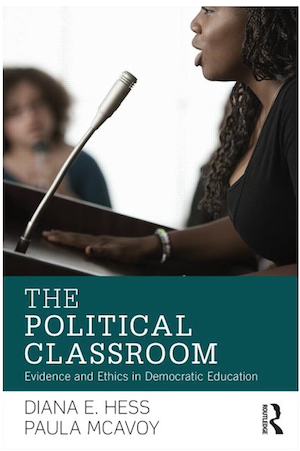Hess, McAvoy Win Grawemeyer Award in Education
December 2, 2016

The Political Classroom won the 2016 AERA Outstanding Book Award
Immigration. Gun control. Abortion. Gay rights. Religion. Are these polarizing topics too controversial to be discussed in today’s high school classrooms?
According to UW–Madison's Diana Hess and Paula McAvoy, co-winners of the 2017 University of Louisville Grawemeyer Award in Education, teachers should encourage conversations about difficult political issues because that's the very nature of a democratic education and those discussions help students understand diverse points of view and become more politically engaged adults.
Hess and McAvoy's 2014 book, "The Political Classroom: Evidence and Ethics in Democratic Education," explores the role of teachers in perpetuating serious, thoughtful political deliberation in schools.
The book is based on a four-year study of 35 teachers and their 1,000-plus students. Their analysis included 21 schools representing all points on the political spectrum.
"This honor means so much to us — in large part because it reinforces the important role that research plays in building ideas that can influence how schools take up the important role of civic education," says Hess, who is dean of the School of Education and holds the Karen A. Falk Distinguished Chair of Education at UW–Madison. "We are grateful to the many graduate students and staff at the Wisconsin Center for Education Research who worked with us on the study, the faculty at UW–Madison and beyond who provided valuable feedback throughout the process, and the foundations that funded the project."
Hess and McAvoy provided compelling case studies that showcased the power of the deliberative process in helping students hone thinking, reasoning and communication skills as they examined the question: "How should we live together?"
“We are honored to receive this recognition from the Grawemeyer Awards,” says McAvoy, who is program director of the Center for Ethics and Education. “The book features several exceptional teachers, and we hope their practices and our findings encourage others to bring discussions of controversial political issues into the classroom.”
All 2017 Grawemeyer Award winners will be announced this week, pending formal approval by the University of Louisville’s board of trustees. The university presents the prizes annually for outstanding works in music composition, ideas improving world order, psychology and education, and gives a religion prize jointly with Louisville Presbyterian Theological Seminary. The winners will present free lectures about their award-winning ideas when they visit Louisville in April to accept their $100,000 prizes.
“Teachers are beginning to worry that all controversial topics are taboo,” says education award director Marion Hambrick. “This timely book dispels that notion and provides tangible evidence that the classroom is an unusual political place where students can learn to carefully examine divisive issues.”
In March, the American Educational Research Association announced that Hess and McAvoy were the recipients of the 2016 AERA Outstanding Book Award for their publication, “The Political Classroom: Evidence and Ethics in Democratic Education.”
UW–Madison’s School of Education then hosted a conference Sept. 24 that was designed to give educators the tools, resources and confidence they’d need to teach about electoral politics in a way that is engaging but respectful to differing points of view. Titled, “Teaching About the 2016 Elections: Preparing Students for Political Engagement,” the daylong event at Grainger Hall was attended by about 250 people.
(Information for this story was taken from a University of Louisville news release by Kim Butterweck announcing the Grawemeyer Award in Education.)


